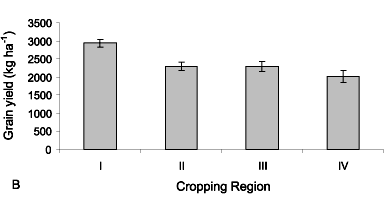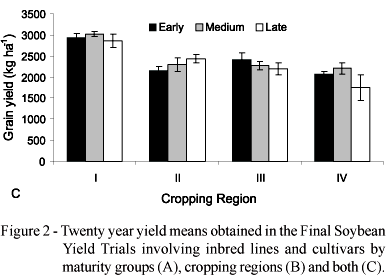The success of a genetic breeding program in a certain period can be assessed by the genetic gain observed. Genetic progress can be estimated from the multi environmental trials (MET) data which are routinely carried out by annual species breeding programs for the assessment of new commercial cultivars. A data set of 20 years of MET of advanced soybean lines derived from four breeding programs was used to estimate and to compare the genetic gains obtained for three soybean maturity groups (early, medium and late) in four cropping regions of the State of Rio Grande do Sul. The estimated yield gains ranged from 0.0 to 71.5 kg ha-1 year-1 (3.49% per year), depending on the maturity group and region, which suggests that the genetic breeding effort does not have a similar effect among the maturity groups or benefit the regions equally. There was no evidence of genetic progress for the early maturity group in any of the four regions, whereas gains in Regions I and IV were comparatively greater than those in Regions II and III. The objectives of the soybean breeding program in the region should be redirected. Since not all the experimental lines used to estimate genetic gains were commercially released, the reported genetics gains were achieved by the breeding programs rather than those achieved by the cropping systems.
Glycine max (L.) Merrill; genetic gain; maturity groups; advanced lines









